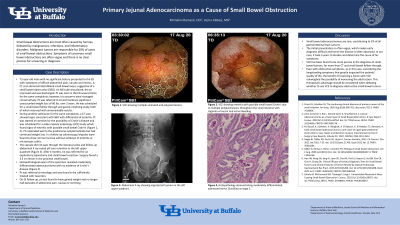Sunday Poster Session
Category: Small Intestine
P1303 - Primary Jejunal Adenocarcinoma
Sunday, October 22, 2023
3:30 PM - 7:00 PM PT
Location: Exhibit Hall

Has Audio

Mrinalini Ramesh, DO
University at Buffalo
Buffalo, NY
Presenting Author(s)
Mrinalini Ramesh, DO1, Uzma Abbasi, MD2
1University at Buffalo, Troy, MI; 2Oneida Health, Oneida, NY
Introduction: Small bowel obstructions are often caused by hernias, followed by malignancies, infections,
and inflammatory disorders. Malignant tumors are responsible for 20% of cases of small bowel
obstructions. We present a case of a patient admitted several times for a small bowel obstruction,
evaluated for Crohn’s disease, and eventually diagnosed with an adenocarcinoma of the jejunum.
Case Description/Methods: This patient is a 72-year-old male with no significant past medical history. He presented to the
emergency department several times for symptoms of diffuse abdominal pain, nausea, vomiting and
unaccounted weight loss of 60 lbs. over two years. A CT scan performed showed signs consistent
with small bowel obstruction and possible differential of enteritis. He was started on steroids for the
possibility of Crohn’s. He was also scheduled for a video capsule endoscopy (VCE) study which
confirmed signs of enteritis. However, biopsies taken from a colonoscopy did not find changes
associated with Crohn’s disease. The capsule did not pass through the ileocecal valve and a follow-up
abdominal X-ray performed noted pill cam retention in the left lower quadrant. The capsule resided
in the patient’s left abdomen for four months. He was referred for an exploratory laparotomy,
wherein a 3.5 cm lesion in the proximal small bowel was discovered. The specimen revealed
moderately differentiated adenocarcinoma, stage II. Oncology stated that he was sufficiently treated
with resection. On follow-up, the patient was found to have gained weight and was no longer
symptomatic.
Discussion: Small bowel tumors are often rare, contributing to 3% of all gastrointestinal tract cancers. The most
common clinical presentation includes extremely vague abdominal symptoms that make early
diagnosis difficult. VCE has been found to be more precise in the diagnosis of small bowel tumors, far
more than CT and small bowel follow-through. This case emphasizes the importance of using VCE
and laparotomy to detect early-stage small intestinal tumors, which are difficult to detect via imaging
studies.
Disclosures:
Mrinalini Ramesh, DO1, Uzma Abbasi, MD2. P1303 - Primary Jejunal Adenocarcinoma, ACG 2023 Annual Scientific Meeting Abstracts. Vancouver, BC, Canada: American College of Gastroenterology.
1University at Buffalo, Troy, MI; 2Oneida Health, Oneida, NY
Introduction: Small bowel obstructions are often caused by hernias, followed by malignancies, infections,
and inflammatory disorders. Malignant tumors are responsible for 20% of cases of small bowel
obstructions. We present a case of a patient admitted several times for a small bowel obstruction,
evaluated for Crohn’s disease, and eventually diagnosed with an adenocarcinoma of the jejunum.
Case Description/Methods: This patient is a 72-year-old male with no significant past medical history. He presented to the
emergency department several times for symptoms of diffuse abdominal pain, nausea, vomiting and
unaccounted weight loss of 60 lbs. over two years. A CT scan performed showed signs consistent
with small bowel obstruction and possible differential of enteritis. He was started on steroids for the
possibility of Crohn’s. He was also scheduled for a video capsule endoscopy (VCE) study which
confirmed signs of enteritis. However, biopsies taken from a colonoscopy did not find changes
associated with Crohn’s disease. The capsule did not pass through the ileocecal valve and a follow-up
abdominal X-ray performed noted pill cam retention in the left lower quadrant. The capsule resided
in the patient’s left abdomen for four months. He was referred for an exploratory laparotomy,
wherein a 3.5 cm lesion in the proximal small bowel was discovered. The specimen revealed
moderately differentiated adenocarcinoma, stage II. Oncology stated that he was sufficiently treated
with resection. On follow-up, the patient was found to have gained weight and was no longer
symptomatic.
Discussion: Small bowel tumors are often rare, contributing to 3% of all gastrointestinal tract cancers. The most
common clinical presentation includes extremely vague abdominal symptoms that make early
diagnosis difficult. VCE has been found to be more precise in the diagnosis of small bowel tumors, far
more than CT and small bowel follow-through. This case emphasizes the importance of using VCE
and laparotomy to detect early-stage small intestinal tumors, which are difficult to detect via imaging
studies.
Disclosures:
Mrinalini Ramesh indicated no relevant financial relationships.
Uzma Abbasi indicated no relevant financial relationships.
Mrinalini Ramesh, DO1, Uzma Abbasi, MD2. P1303 - Primary Jejunal Adenocarcinoma, ACG 2023 Annual Scientific Meeting Abstracts. Vancouver, BC, Canada: American College of Gastroenterology.
